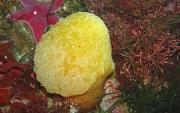Melanoma Fighter - a podcast by The University of Texas Marine Science Institute
from 2021-01-31T01:00

Melanoma kills thousands of Americans every year, and attacks tens of thousands. So far, there’s no cure. But a potato-shaped organism in the waters around Antarctica may offer a solution. The organism produces a compound that’s shown some promise in treating this nasty form of skin cancer.
Sea squirts are found all across the planet -- in waters warm and cold, shallow and deep. The potato-shaped organisms usually anchor to a solid surface and spend their entire lives in a single spot. They pull in water through one opening in their leathery bodies, then squirt it out through another -- hence the name. They filter food and oxygen from the flow.
Several drugs are based on compounds found in sea squirts, including some that fight cancer. And researchers have identified many other compounds that could have medical uses as well.
One is found in a species in the Antarctic. The compound is known as palmerolide A, and it’s shown promise as a melanoma treatment. It’s probably produced not by the sea squirt itself, but by bacteria that live inside it. Scientists haven’t identified which bacteria are responsible for the potentially life-saving compound. But in a recent study, a team collected sea squirts from waters around an Antarctic island. The scientists then identified all the types of bacteria living inside the squirts. That should help them figure out how the palmerolide is made.
And that could help efforts to turn the compound into a cure for a deadly skin cancer.
Further episodes of Science and the Sea podcast
Further podcasts by The University of Texas Marine Science Institute